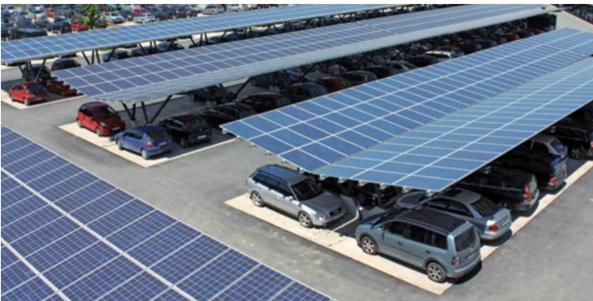The electric vehicle “hyper hub” vehicle rapid recharging points planned to be installed at Poppleton and Monks Cross have trebled.

In March a report quoted the cost at £700,000. The scheme envisaged the use of a solar canopy with battery storage facilities. The scheme was to have been funded entirely from central government grants.
Existing Council owned charging points, although criticised for poor maintenance standards, have usage rates of over 1500 sessions per month, and have also been a catalyst for the use of electric buses on the Park&Ride network. York is an air quality management area with regular exceedances of NO2 levels in urban highly populated areas due principally to transport emissions resulting in air pollution.
High power charging brings challenges for the UK local grids in providing short term peak power capacity and reducing the carbon intensity of fuels from a national grid perspective. The Hyper Hubs aims to resolve both of these issues by reducing the peak power demand on the grid and prioritising renewable energy supply through the supply of low carbon energy generated on site.
The plans envisage 8 recharging points at each site. The electric vehicle infrastructure element of the project is to purchase and install the DC ‘hyper’ charging points (faster than current ‘rapid’ charge speed points at 50kW) which will supply the energy to the vehicles. These will be installed in a Hub of eight car bays which can supply up to 150kW power output per car, with a typical charging session taking 10-20 minutes. By way of comparison, a typical home charging point takes around eight hours to charge an electric vehicle.

A typically electric vehicle will have between 30kWh and 100kWh of battery capacity. Most vehicles will be able to travel 4~5 miles per kWh. A typical charging session on a 150kW charger would give ~200 miles range in 20 minutes depending on the battery pack’s initial state of charge.
Earlier in the year the project was criticised for prioritising out of town locations for the chargers. It was pointed out that the terraced streets which are generally located towards the City centre did not have easy access to rapid chargers and that a more conventional approach to power supply might there have greater results. (The Council have abolished ResPark charging discounts for other than ULEVs).
That controversy may reappear now with the cost per recharging point having soared to £138,000 each. It means that the Council will not be able to fund alternatives either in the form of better cycling facilities (better road repairs) or many more rapid charging units at a cost of less than £30,000 per unit.
The cost of installing 50 on street chargers (of which a government subsidy would be available) would be in the region of £250,000.
York taxpayers are being asked to contribute around £400,000 to the costs of the hyper hubs.
It is unclear what fees will be payable by users of the chargers

The Council says that the reliability of its existing charging hub network is improving.
“In 2013 City of York Council led the way in encouraging low emission vehicle usage by installing a range of APT (brand) public charging infrastructure sites for electric vehicles around the City. However, being an early adopter has meant that much of the estate is now life expired, unreliable and some of the charge points have 3 pin sockets which no longer meet The Alternative Fuels Infrastructure Regulations 2017”.
Whilst the ambition to install EV was positive and the outcome was good at the time, this was not supported by a wider strategy associated with the installations in terms of the overall management, support and maintenance.
In response to this, the assets have now been moved in terms of responsibility and an audit of the current estate has been undertaken.
At the time of the audit around 44% of the chargers were operational.
Full Council approved £25k to invest in the short-term repair and maintenance of the assets.
The Transport Systems team is now in the process of commissioning the work to put in place the repairs to the assets and 84% of the charging units are now functional
